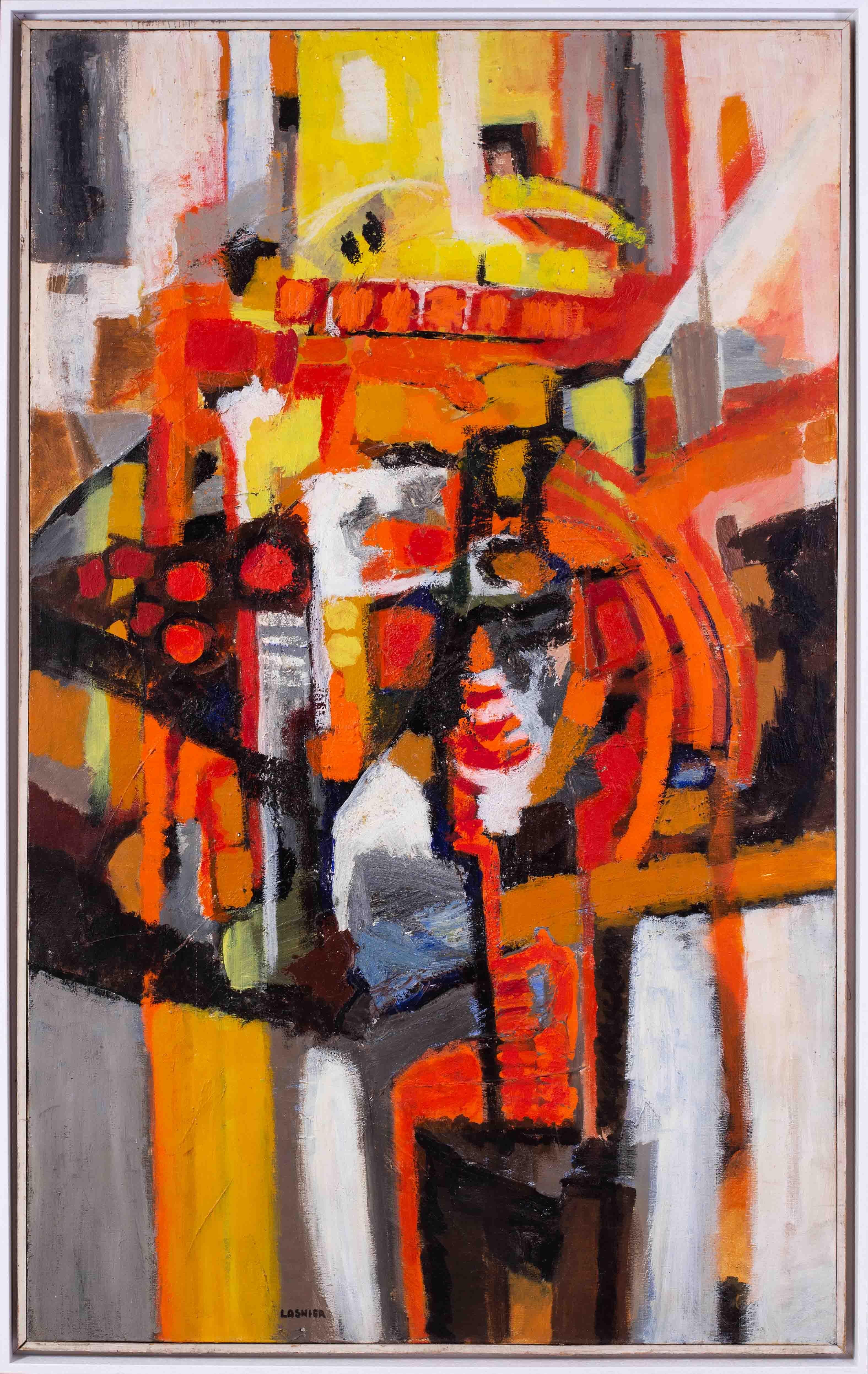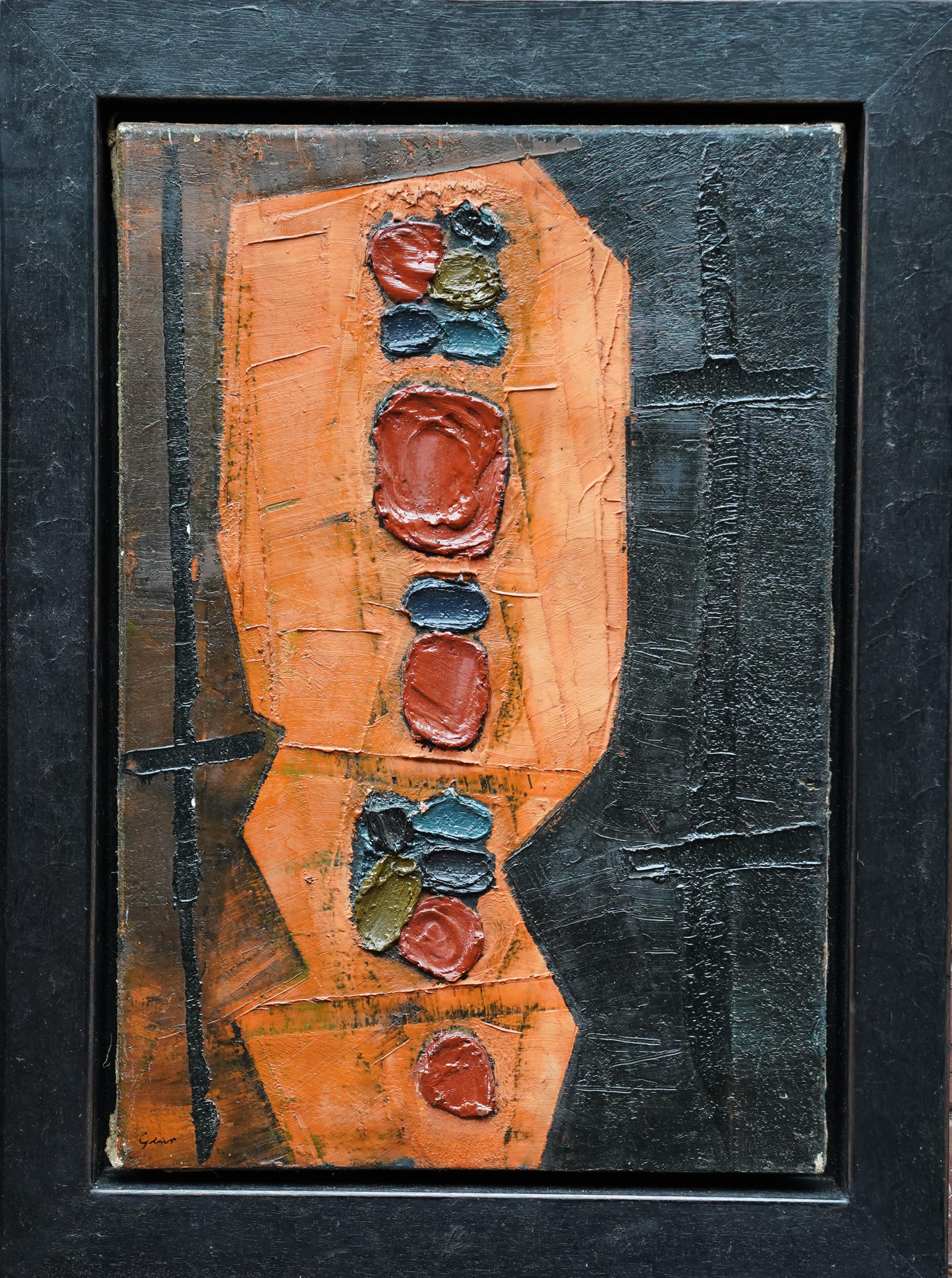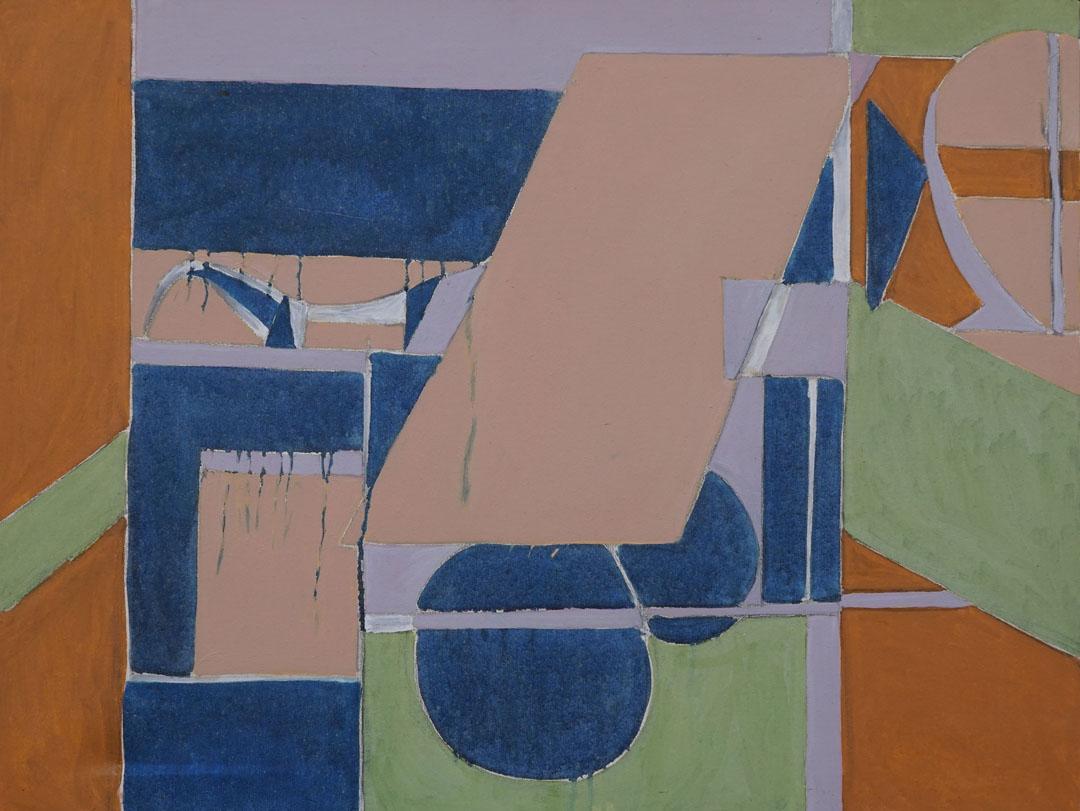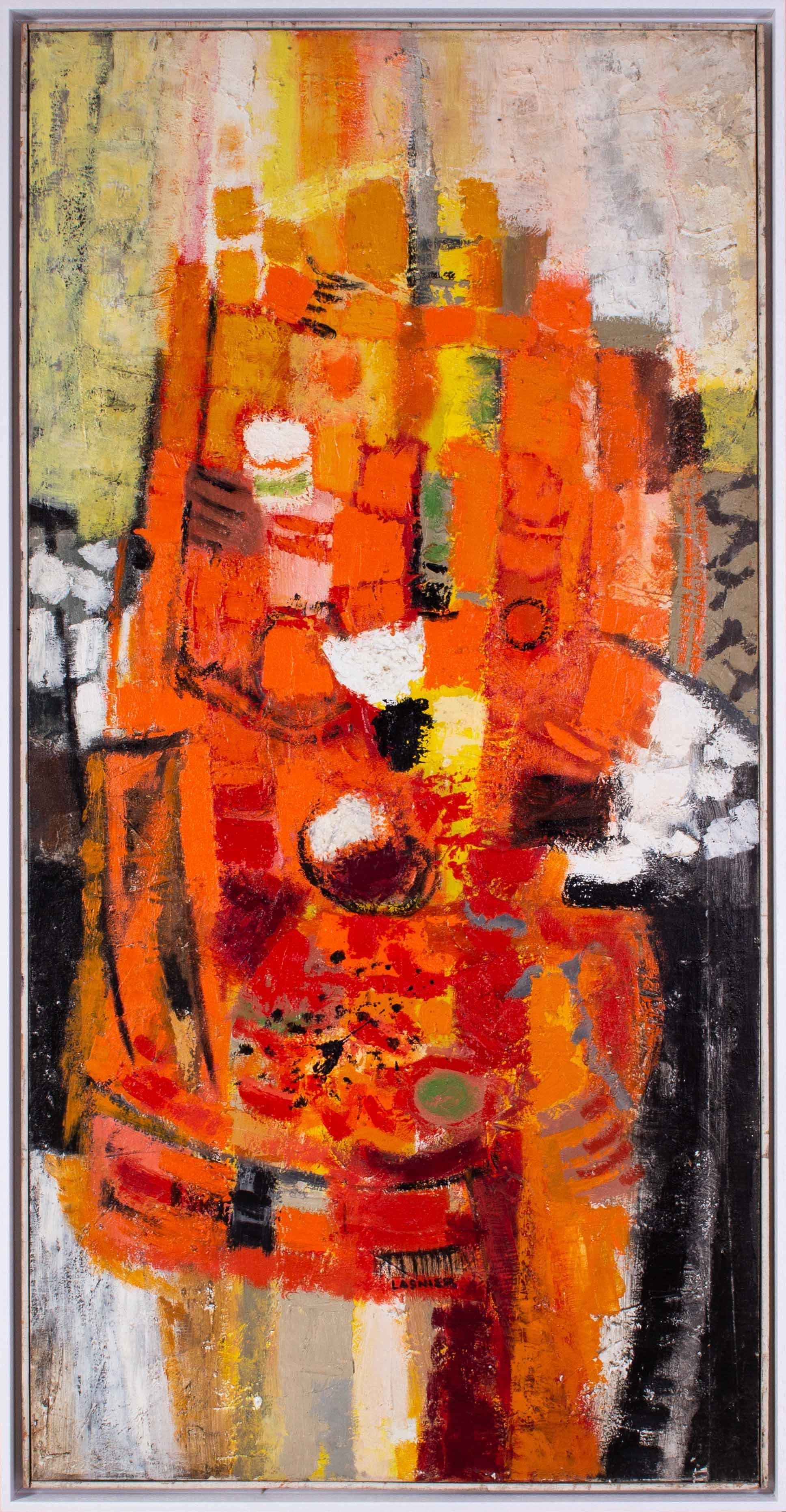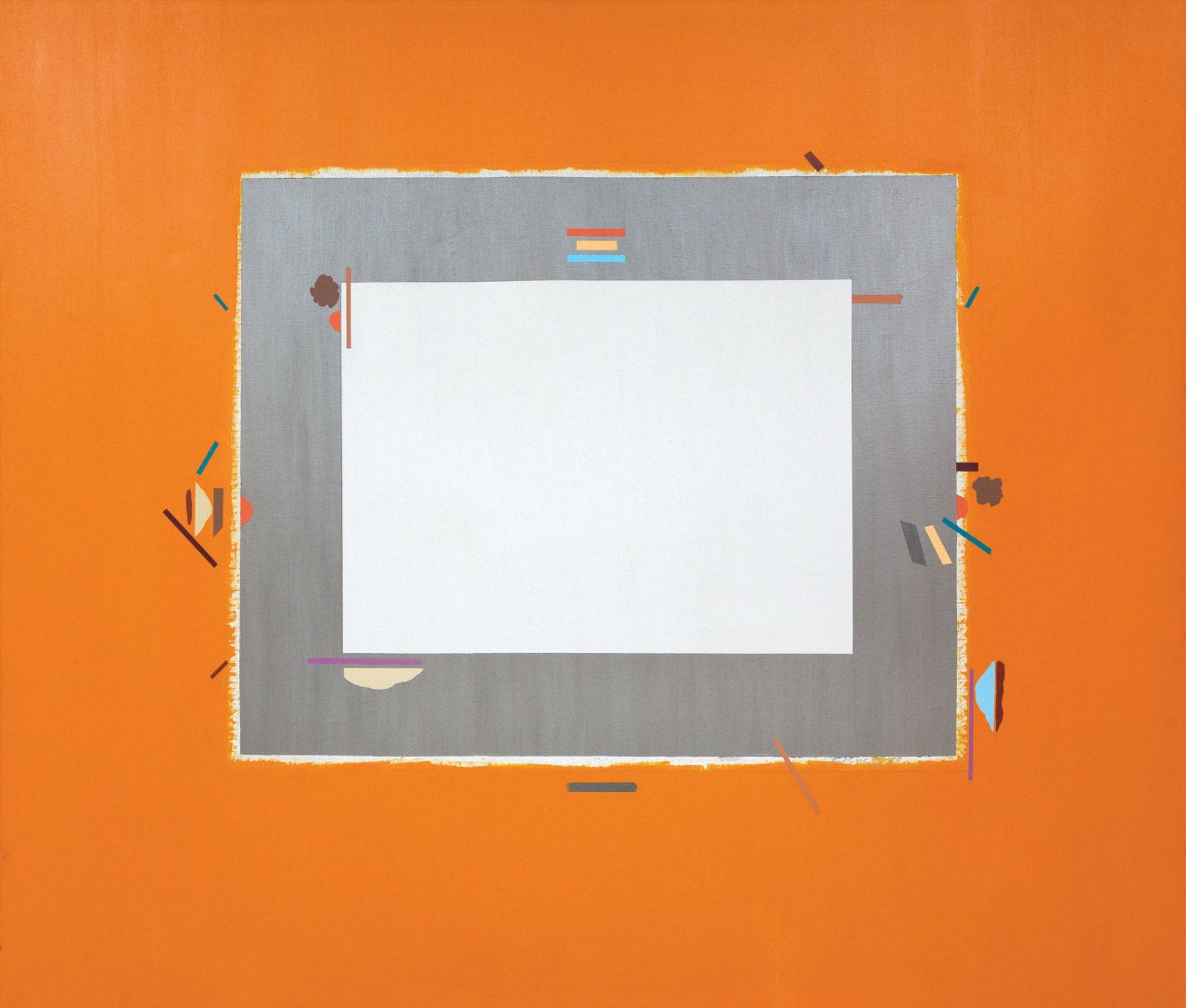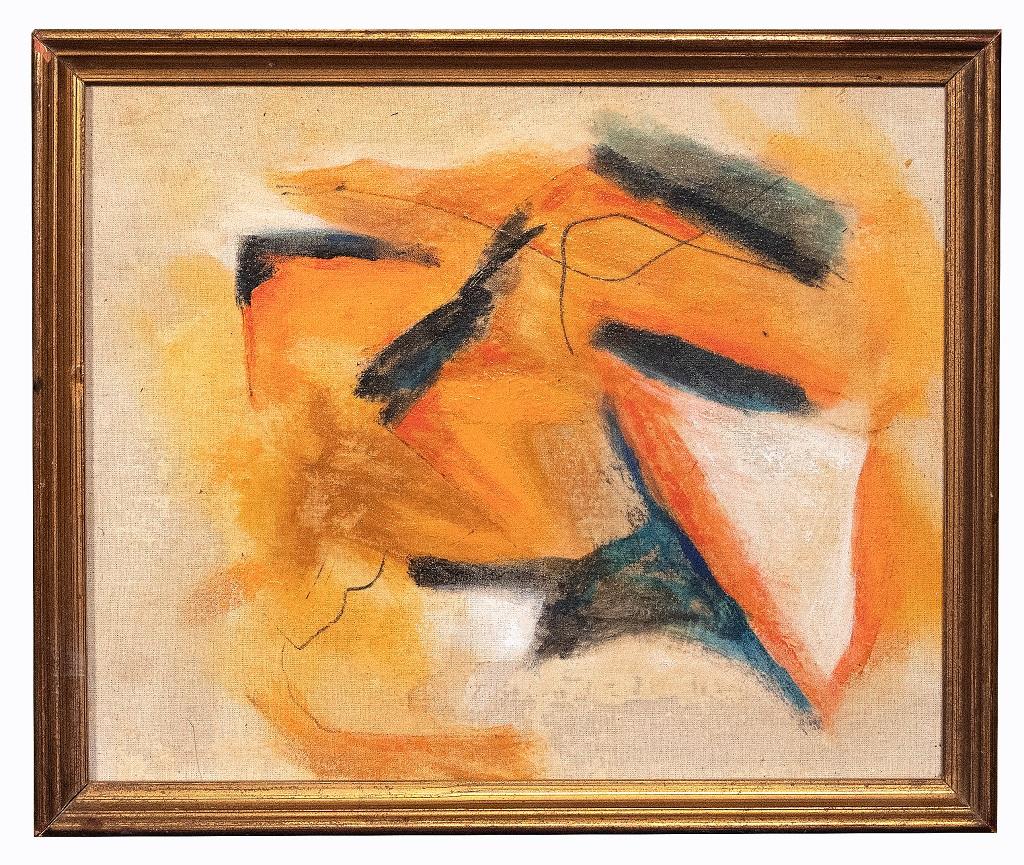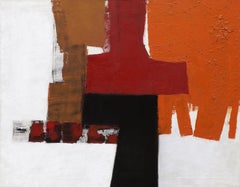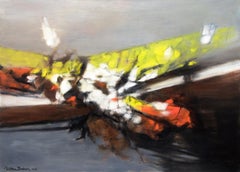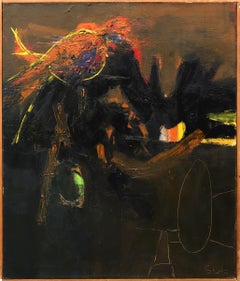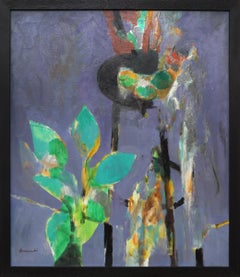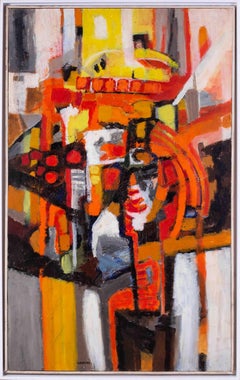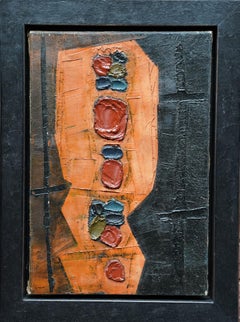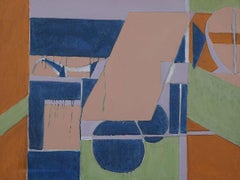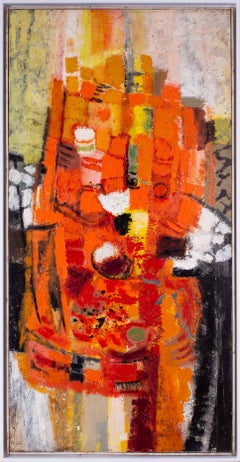Items Similar to Bernard Arnest “Signals, Orange/Black” 1962 Abstract Oil Painting, Signed, Frame
Video Loading
Want more images or videos?
Request additional images or videos from the seller
1 of 21
Bernard ArnestBernard Arnest “Signals, Orange/Black” 1962 Abstract Oil Painting, Signed, Frame1962
1962
$8,500
£6,502.58
€7,478.72
CA$12,139.08
A$13,380.58
CHF 6,913.84
MX$159,955.43
NOK 86,975.64
SEK 81,744.71
DKK 55,859.42
About the Item
Signals, Orange/Black is a dynamic 1962 oil painting on masonite by American modernist Bernard Arnest (1917–1986). Signed by the artist in the lower center and titled on the reverse, this striking work features a bold geometric composition in vibrant hues of orange, black, red, yellow, and green. Measuring 36 ½ x 27 ½ inches in its original artist-designed frame, the image itself spans 36 x 27 inches.
This piece is part of Arnest’s celebrated Signals Series and was exhibited in his important 1962 solo show at Kraushaar Galleries in New York—one of the key moments in his artistic career. With its confident structure and expressive use of color, the painting exemplifies Arnest’s signature blend of abstraction and emotional resonance.
About the Artist:
Bernard Arnest was a leading figure in Colorado’s mid-century modern art scene. Trained under Boardman Robinson and Henry Varnum Poor at the Broadmoor Art Academy, he received a Guggenheim Fellowship in 1940 and held his first solo exhibition at the San Francisco Museum of Art. Over his career, Arnest exhibited at institutions such as the Whitney Museum, Corcoran Gallery, and Carnegie Museum of Art. He also served as professor and chair of the art department at Colorado College (1957–1982), influencing generations of artists.
A powerful and rare example of Arnest’s work from a pivotal period, Signals, Orange/Black is a standout piece of American abstract art.
Provenance: Solo exhibition at Kraushaar Galleries, NYC, October 1962.
- Creator:Bernard Arnest (1917 - 1986, American)
- Creation Year:1962
- Dimensions:Height: 36.5 in (92.71 cm)Width: 27.5 in (69.85 cm)Depth: 1.5 in (3.81 cm)
- Medium:
- Movement & Style:
- Period:
- Framing:Frame IncludedFraming Options Available
- Condition:very good condition.
- Gallery Location:Denver, CO
- Reference Number:Seller: 266251stDibs: LU27311235342
About the Seller
5.0
Gold Seller
Premium sellers maintaining a 4.3+ rating and 24-hour response times
Established in 1979
1stDibs seller since 2013
298 sales on 1stDibs
Typical response time: 5 hours
- ShippingRetrieving quote...Shipping from: Denver, CO
- Return Policy
Authenticity Guarantee
In the unlikely event there’s an issue with an item’s authenticity, contact us within 1 year for a full refund. DetailsMoney-Back Guarantee
If your item is not as described, is damaged in transit, or does not arrive, contact us within 7 days for a full refund. Details24-Hour Cancellation
You have a 24-hour grace period in which to reconsider your purchase, with no questions asked.Vetted Professional Sellers
Our world-class sellers must adhere to strict standards for service and quality, maintaining the integrity of our listings.Price-Match Guarantee
If you find that a seller listed the same item for a lower price elsewhere, we’ll match it.Trusted Global Delivery
Our best-in-class carrier network provides specialized shipping options worldwide, including custom delivery.More From This Seller
View AllMid Century Abstract Oil Painting in Orange, Red, Brown, White and Black
Located in Denver, CO
Discover a captivating original abstract oil painting on canvas by the renowned artist Henriette "Yetti" Stolz. This untitled masterpiece showcases a rich and dynamic composition, blending deep browns, bold reds, and warm oranges in a way that evokes both intensity and movement. The textured brushstrokes and layered hues create a mesmerizing depth, making this painting a standout piece in any space.
This striking artwork is expertly framed in a new, custom hand-carved wood frame, enhancing its presentation and longevity. The overall framed dimensions are 31 ¼ x 36 ¼ inches, while the unframed image itself measures 34 x 28 inches.
Provenance
This painting comes directly from the estate of the artist...
Category
20th Century Abstract Abstract Paintings
Materials
Canvas, Oil
Mid-Century Modern Abstract Oil Painting by Watson Bidwell, Bold Colors
Located in Denver, CO
This original mid-century modern abstract oil painting by Watson Bidwell (1904–1964) showcases a striking interplay of vibrant orange, green, and white ...
Category
Mid-20th Century Abstract Expressionist Abstract Paintings
Materials
Oil
$7,600 Sale Price
20% Off
Mid-Century Modern Abstract Bird Oil Painting by Henriette Yetti Stolz, 1950s
Located in Denver, CO
This captivating untitled abstract oil on canvas by renowned mid-century artist Henriette “Yetti” Stolz vividly portrays an abstract bird in rich, earthy hues of brown, green, and or...
Category
20th Century Abstract Abstract Paintings
Materials
Oil
1950s Framed Abstract Still Life Oil Painting, Blue Green Black Orange White
Located in Denver, CO
This vibrant and expressive 1959 oil on canvas painting by Bernard Arnest (1917–1986), titled Untitled (Fruit, Leaves, Spotted Cloth), presents an abstracted still life rich in form ...
Category
1950s Abstract Abstract Paintings
Materials
Oil
$5,800 Sale Price
30% Off
Large Mid-Century Modern Abstract Cityscape Painting by Henriette Yetti Stolz
Located in Denver, CO
This dramatic mid-century oil and spackle painting by Henriette “Yetti” Stolz (American, 20th century) presents a bold abstract interpretation of a cityscape, featuring a dynamic bri...
Category
Mid-20th Century American Modern Abstract Paintings
Materials
Oil, Putty
1962 Mid-Century Abstract Oil Painting by Walter Blakelock Wilson, Framed
Located in Denver, CO
This striking Mid-Century Modern abstract expressionist oil painting by Walter Blakelock Wilson (1929–2011) dates to 1962 and exemplifies the dynamic energy of the era. A vibrant sym...
Category
Mid-20th Century Abstract Expressionist Abstract Paintings
Materials
Oil
You May Also Like
Large French 20th Century abstract oil painting in orange hues by Lasnier
Located in Petworth, West Sussex
Jean Maurice Lasnier (French, 1922 – 2006)
URBAN ORANGE
Signed ‘LASNIER’ (lower right)
Oil on canvas
57.1/2 x 35 in. (146.5 x 88.7cm.)
Category
20th Century Abstract Abstract Paintings
Materials
Canvas, Oil
Enigma No. 1 - Scottish 1950's Abstract art oil painting orange black
By William Gear
Located in Hagley, England
This superb Scottish abstract oil painting is by noted artist William Gear. It was painted in 1954, entitled Enigma 1 and is an orange geometric shape on a black background that blen...
Category
1950s Abstract Abstract Paintings
Materials
Oil
Naval Occurrence, orange, blue & green mid-century, abstract geometrical work
By Richard Andres
Located in Beachwood, OH
Richard Andres (American, 1927-2013)
Naval Occurrence, c. 1963
oil on canvas
signed and titled verso
24 x 32 inches
Richard Andres was born in Buffalo, New York in 1927. A graduate of the Cleveland Institute of Art in 1950, he was immediately drafted and served for two years in the army as a mural painter. He received his Master of Arts from Kent State in 1961. A frequent exhibitor at galleries and museums and winner of multiple May Show prizes, Andres taught art in the Cleveland Public Schools for 28 years, as well as teaching the University of Buffalo, the Cleveland Institute of Art and the Western Reserve University.
Very little in Richard Andres’ childhood would have predicted his love of classical music, mid-century-modern architecture and certainly not his lifelong passion for art and in particular abstract art. Richard’s father, Raymond, had no more than a third-grade education, and his mother, Clara, was one of thirteen children – only three of whom lived into adulthood and none of whom attended high school.
They lived, when Richard was a boy, in a dingy area of Buffalo, NY in a walk-up apartment situated above a tavern. Raymond and Clara supplemented the income from their factory jobs in the bar downstairs with Raymond playing ragtime on the piano and Clara serving drinks. This often left Richard and his two older brothers at home alone to fend for themselves. The two older boys, Raymond and Russell, were - unlike Richard- rather rough and tumble and entertained themselves with stickball, boxing and the like. Richard, on the other hand, from a very young age liked to draw, or better yet even, to paint with the small set of watercolors he received for Christmas one year. Paper, however, at the height of the depression, was hard to come by. Luckily, Clara used paper doilies as decoration for the apartment and Richard would contentedly paint and then cut up doilies, gluing the pieces together to create collages.
At eight-years-old, he discovered the Albright-Knox Museum (then known as the Albright Art Gallery) and spent several hours a week there studying the paintings. He was particularly fond of Charles Burchfield‘s landscapes, enamored with their ‘messiness’ and thinking that they somehow captured more ‘feeling’ than works he was previously familiar with. For his tenth Christmas, he asked for and received a ‘how-to’ paint book by Elliot O’Hare. Through this self-teaching, he assembled the portfolio needed for acceptance to Buffalo Technical High School where he studied Advertising Arts. In his Junior year, he was encouraged to enter a watercolor painting, “Two Barns,” in the national 1944-45 Ingersoll Art Award Contest and was one of twelve grand prize winners – each one winning one hundred dollars. More importantly the painting was exhibited at the Carnegie Institute Galleries, which resulted in his winning a national scholarship to the Cleveland School of Art (The Cleveland Art Institute).
He flourished at the art school under the tutelage of faculty members such as Carl Gaertner, as well as that of visiting artists such as William Sommer and Henry George Keller. He would say in later years that Gaertner, in particular, influenced his attitude toward life as well as art. “Gaertner,” Andres said, “believed that there was no need to be a ‘tortured artist’, that an artist should rather enjoy beauty, family, and life in general.” Free to spend his days as he chose, he wandered the Cleveland Art Museum for most of the hours he was not attending classes or painting; the remaining time was spent drinking coffee at a local hangout with art school friends – which is where he met fellow Henry Keller scholarship winner, Avis Johnson. Richard was immediately smitten with Avis, but being rather shy, it took him the entire summer of 1948 to build up his courage to ask her out. Over that summer he ‘thought about Avis’ and worked in a diner to save money. He also used the hundred-dollar prize money won in High School to visit the first Max Beckmann retrospective in the United States at the City Art Museum in St. Louis. Over a half century later he spoke of that exhibit with a reverence usually reserved for spiritual matters, “I walked in and it was like nothing I had ever seen before... the color...It just glowed.”
Returning to campus in the Fall, the first thing he did was go to the coffee shop in hopes of finding Avis. He did, and she, upon seeing him, realized that she was also smitten with him. They quickly became known as ‘the couple’ on campus, and a year later, with Richard being drafted for the Korean war, they were quickly married by a Justice of the Peace, celebrating after with family at Avis’s Cleveland home. As a gift, faculty member John Paul Miller designed and made the simple gold wedding ring Avis wore for their 65 years of marriage. During those 65 years neither wavered in their mutual love, nor in the respect they shared for one another’s art.
The couple lived in a converted chicken coop in Missouri while Richard was in boot camp. At the camp, he would volunteer for any job offered and one of those jobs ended up being painting road signs. His commander noticed how quickly and neatly he worked and gave him more painting work to do - eventually recommending him for a position painting murals for Army offices in Panama. Until her dying day, Avis remained angry that “The army got to keep those fabulous murals and they probably didn’t even know how wonderful they were.” In Panama, their first son, Mark, was born. After Richard’s discharge in 1953, they moved back to the Cleveland area and used the GI bill to attend Kent State gaining his BA in education. The small family then moved briefly to Buffalo, where Richard taught at the Albright Art School and the University of Buffalo – and their second son, Peter, was born. Richard had exhibited work in the Cleveland May Show and the Butler Art Museum during his art school years, and during the years in Buffalo, his work was exhibited at the gallery he had so loved as a child, the Albright Art Gallery.
In 1956, the family moved back to the Cleveland area and Richard began teaching art at Lincoln West High School during the day while working toward his MA in art at Kent State in the evenings. Avis and Richard, with the help of an architect, designed their first home - a saltbox style house in Hudson, Ohio, and in 1958, their third son, Max (after Max Beckmann) was born. Richard enjoyed the consistency of teaching high school as well as the time it gave him to paint on the weekends and during the summer months. In 1961, he received his MA and his daughter, Claire, was born. With a fourth child, the house was much too small, and Avis and Richard began designing their second home. An admirer of MCM architecture, Richard’s favorite example of the style was the Farnsworth house – he often spoke of how the concepts behind this architectural style, particularly that of Mies van der Rohe, influenced his painting.
Andres described himself as a 1950’s...
Category
1960s Abstract Geometric Abstract Paintings
Materials
Oil
Large French 1970s Abstract painting in orange hues by Jean-Maurice Lasnier
Located in Petworth, West Sussex
Jean Maurice Lasnier (French, 1922 – 2006)
VILLE SOLAIRE, OCTOBER 1971
Signed ‘LASNIER’ (lower middle)
Oil on canvas
62.1/2 x 31.1/2 in. (158....
Category
20th Century Abstract Abstract Paintings
Materials
Canvas, Oil
Yizzle (abstract, orange, gray, geometric, large, acrylic on canvas painting)
By Carole Eisner
Located in New York, NY
1970s Geometric Abstract painting in bright oranges and silver tones, oil on linen
Category
1970s Contemporary Paintings
Materials
Linen, Oil
$13,500 Sale Price
25% Off
Orange and Black Composition - Oil paint by Giorgio Lo Fermo - 2012
By Giorgio Lo Fermo
Located in Roma, IT
Orange and Black Composition is an original contemporary artwork realized by the Italian artist Giorgio Lo Fermo in 2012.
Original Oil painting on plywood.
Hand-signed and dated o...
Category
2010s Abstract Expressionist Abstract Paintings
Materials
Oil
More Ways To Browse
Bernard Artist
Paintings On Masonite Vintage
1962 Paintings
Bernard Oil Painting
Mid Century Painting Signed Bernard
Paintings By Bernard
Bernard Arnest
30 X 30 Painting
Abstract Forest Painting
Barnett Newman
Abstract Floral Oil Painting
Lyrical Abstract
Savannah Vintage
Abstract Grid Art
Waves Acrylic Painting
Eastern Painting
Non Objective Paintings
Series Of Abstract Art
